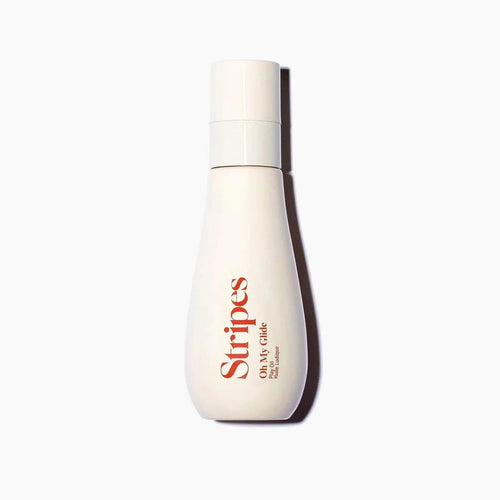Dry skin is one of the most common indicators that you’re beginning your transition into menopause. And not just dry — it can also be rough, flaky, and feel parched on your face and body.
Here’s what you need to know about common skin changes during perimenopause and menopause.
What causes dry skin during perimenopause and menopause?
When our estrogen declines, it can have effects on our skin. We experience a loss in collagen and oils, making our skin become dry and itchy (not to mention making our hair drier and nails more brittle). This decrease in moisture may begin with perimenopause, the years before our periods stop and we enter menopause.When we’re young, our skin is soft and bouncy. As we get older our skin gets thinner and more fragile, like tissue paper. The lines on our skin become more pronounced. Our cells don’t turn over as rapidly on our faces and our bodies as they used to.
What are some other skin changes that happen during menopause and perimenopause?
As we age and our skin loses collagen, we may notice the following changes:
- Dry skin on nipples and around eyes
- Fine lines around the face and mouth
- Loss of skin elasticity
- Flat brown spots on the face and hands
- Random dark hairs on your skin, upper lip, and neck
- Adult acne
If you were a sun worshiper in your youth, you’re going to start seeing it in your skin. Exposure to the sun breaks down collagen and elastin, causing your skin to lose its elasticity. Sun damage can cause your skin to feel rougher and look more creased and lined. You may start seeing tan or brown spots on your face and parts of the body that were exposed to the sun over time.
What can I do to address skin dryness and changes during menopause and perimenopause?
There’s no such thing as “anti-aging,” we cannot turn back the clock on our skin. That said, there are things we can do to relieve dryness, itchiness, and sensitivity.
Stay out of the sun.
Even on cloudy days. But don’t stay inside and hide from the outside world. Choose sunscreens that protect against UVA and UVB rays in order to protect your skin and prevent skin cancers. Products that contain zinc or titanium oxide create a physical barrier against the sun’s rays. Hats, clothing with SPF, and bathing suits with sleeves and a high neck will help you enjoy summertime and keep your skin in better condition.
Quit smoking cigarettes.
Nicotine and other chemicals in tobacco products can keep nutrients and oxygen from reaching your skin due to decreased blood flow to the skin. In addition to causing damage to your heart and lungs, it can create deep lines around the face, mouth, and eyes due to the repeated facial gestures you make when you puff and exhale. Your skin may even take on a yellowish cast, making it appear drawn and sallow. Smoking has been linked to skin cancer and increased risk of deadly melanoma.
It’s never too late to quit. Even if you're a longtime smoker, your skin will look better and have less wrinkles than your friend who never kicked the habit.
Moisturize everywhere.
Face, shoulders, knees, and toes — you don’t need to spend hundreds of dollars on skin creams with exotic-sounding ingredients to soothe dry and itchy skin. When selecting products, consider creams, which can be richer and more moisturizing than lotions. Try applying moisturizer to your face and body after a (warm, not boiling hot) shower.
A moisturizer that contains ingredients like Ectoine, Squalane, and glycerin provides hydration and seals the moisture in. Products with ceramides may stimulate cell growth. Products containing retinol are helpful, though retinol makes some skin more sensitive to sunlight.
Select better face and body soaps.
Look for ones that moisturize and don’t contain grit or rough exfoliating bits. If your skin is sensitive, choose a gentler soap. And be gentle when you dry your face too — don’t rub hard with your towel or facecloth.
Keep laughing.
There are plenty of products that target creases around your mouth and eyes, and that’s fine. But joyous or hilarious moments in life reduce stress, which is way worse on your health than a few lines.
When should I talk to my doctor about my dry skin during menopause and perimenopause?
The cause of your dry skin may not be from menopause. If the changes to your skin are noticeable, it might be an indication of a problem with your thyroid, or be linked to diabetes or kidney disease.Your dermatologist may recommend products with retinoids or write your a prescription for vitamin A–based tretinoin or Retin-A, to increase cell turnover. Tretinoin is also used to soften skin and help fade skin spots.
If you see raised moles or spots that look suspicious, it’s especially important to see your dermatologist right away. A yearly appointment for a skin check is always recommended. Your derm may spot things on your body that you don’t, such as on your back, neck, and thighs.
No need for dismay. For all the itchy or oily/dry days there will be plenty where you look, and feel, just fine. Add in a few healthy lifestyle changes, get some advice from your dermatologist, and you’ll start to see a more familiar face in the mirror.





